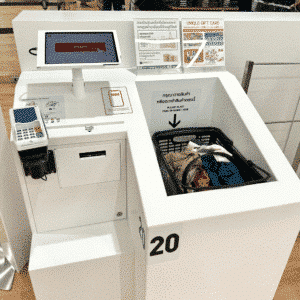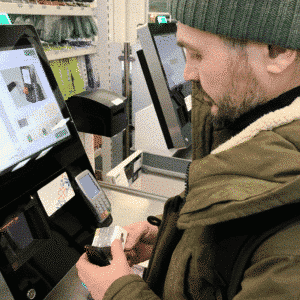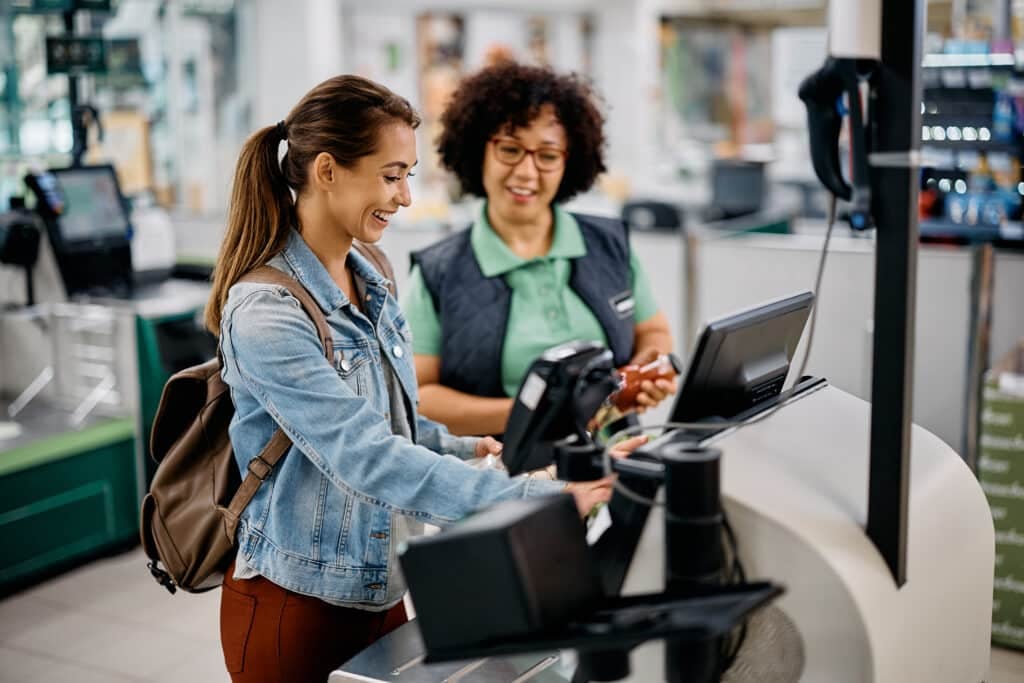The US retail industry is undergoing a significant transformation, and smart checkout technology is playing a pivotal role in shaping the future of retail transactions.
For OEMs developing self-checkout technology, staying competitive means more than just offering basic functionality—it requires integrating advanced cash-handling solutions that improve efficiency, security, and customer satisfaction.
Cash remains a dominant payment method for many consumers, yet self-checkout technology can present challenges to this:
Operational inefficiencies – Manual cash handling increases labor costs and slows down transactions.
Security risks – Cash theft and counterfeit currency are persistent concerns.
Customer friction – Slow change dispensing and frequent malfunctions lead to frustration.
 Customer friction has led to mixed opinions of the technology by the end users. Some find the autonomous approach a simple alternative to human cashiers, while others find them frustrating and rarely more effective. Typically, retailers remain interested in the power of self-checkout technology to better leverage their human resources.
Customer friction has led to mixed opinions of the technology by the end users. Some find the autonomous approach a simple alternative to human cashiers, while others find them frustrating and rarely more effective. Typically, retailers remain interested in the power of self-checkout technology to better leverage their human resources.
To address these issues, leading OEMs are turning to cash automation technologies, particularly cash recyclers and bank note validators, as a way to differentiate their systems in an increasingly crowded market.
Retailers like the Japanese clothing company, Uniqlo (left), have revolutionized their self-service checkouts using RFID technology to mitigate potential barcode errors and enable more seamless transactions. This is a great indication of where specialized machines could go in the future, but tagging goods with RFID chips may not be feasible for many retailers, especially those with dozens of supply chains. It’s now time for the industry to specialise further and adapt to different sub-categories of retailers and markets.
What is the Future of Smart Checkout Technology
In short, improved cash automation modules for self-checkouts will thrive in the US retail sector. Being able to provide a more intelligent approach to handling cash in self-checkout technology, retailers will be able to mitigate the issues felt by the market. These include:
1. Reduced Operational Costs
By automating cash storage, dispensing, and reconciliation, recyclers eliminate the need for frequent cash pickups and manual counting. This reduces labor expenses and minimizes cash-related errors, a major concern for larger retailers.
2. Faster, More Reliable Transactions
Traditional hopper-based systems can be slow and prone to jams. Modern recyclers process cash quickly, ensuring quick change dispensing and shorter checkout lines—critical for high-traffic retail environments.
3. Enhanced Security & Fraud Prevention
Advanced validation technology detects counterfeit bills and ensures only genuine currency is accepted. Automated tracking also reduces internal theft risks by maintaining a digital record of all cash movements.
4. Improved Customer Experience
A seamless checkout process builds trust and encourages repeat usage. Consumers expect fast, error-free transactions—whether paying with cash or card.
Key Considerations for OEMs Integrating Cash Automation

Leading manufacturers are already adopting recyclers to future-proof their kiosks, ensuring they meet the evolving demands of retailers across grocery, convenience, and big-box stores. When selecting cash-handling technology for Smart Checkout systems, OEMs need to prioritize several key factors to meet the demands of both retailers and modern consumers. Speed and reliability are paramount; the recycler must handle high transaction volumes efficiently and without interruption to minimize customer wait times and ensure a seamless checkout experience. A compact design is also crucial, as it needs to fit within the existing kiosk footprint to maintain the kiosk’s sleek appearance and conserve valuable retail space.
Additionally, compatibility with different POS software is essential to ensure smooth integration and avoid disruptions to the retailer’s existing systems. Minimal maintenance requirements are also vital to reduce downtime and associated costs, ensuring that the kiosk remains operational and available to customers. By adopting recyclers that meet these criteria, OEMs can future-proof their kiosks and demonstrate their commitment to meeting the evolving needs of retailers and consumers in an increasingly fast-paced and technologically advanced retail landscape.
The Competitive Advantage of Next-Gen Cash Handling
Certain counter-based retailers believe that long queues can actually increase customer spending, say, as you wait for the bakery line to reduce. Initially, you might have just wanted one baguette, but with time, you consider buying more than intended initially to justify the extended period in the queue. The psychology of this is still up for debate, but it’s only suitable for certain counter-based retailers. In fact, in a more traditional supermarket where you obtain your products first and then scan them, long queues have the opposite effect. Getting fast, fluid throughput in your stores is therefore crucial to maintain market share in your vicinity, and self-checkout platforms offer a solution.
As smart checkout adoption grows, OEMs that prioritize customer-first improvements will have a clear edge. Retailers are eager to find a solution that caters to their customers in a positive manner, as well as minimizes the impact on their internal resources.

Looking to enhance your smart checkout systems with advanced cash automation?